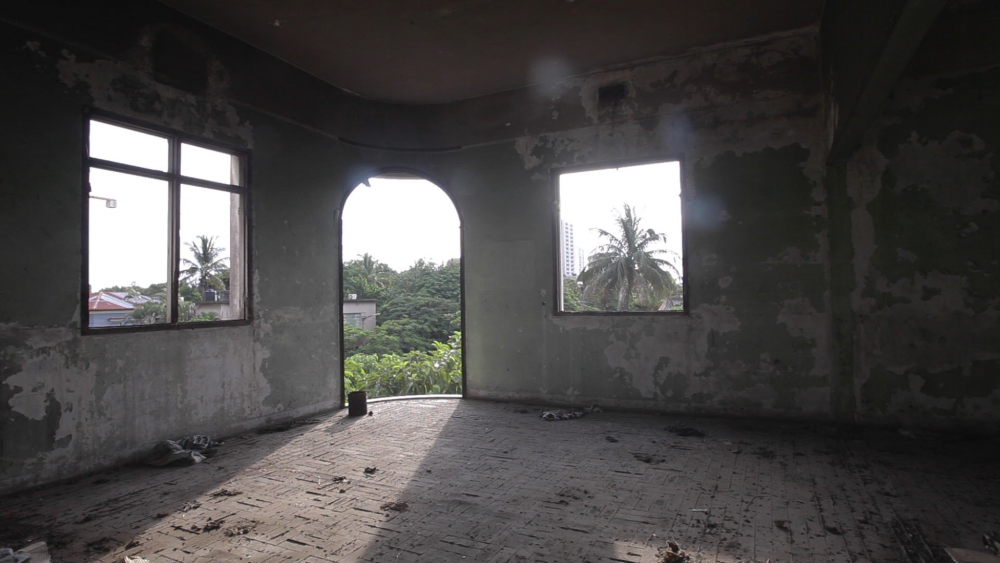The Utopia of a New Country
Review of the film, A Memory in Three Acts.

By Kolawole Oludamilare
The documentary film A Memory in Three Acts is a brutal picture of memories; times and events of Mozambique’s colonial era and struggle for liberation. Directed by the Mozambican director and cinematographer, Inadelso Cossa, the film scavenges the relics of the country’s most trying times in history. Through oral narratives and poetic visualization of colonial edifices where most of the heinous crime of torture, killings and maiming took place, the film, in dreamlike fashion, rummages through the past.
The encroachment of Mozambique by the Portuguese dates back to the fifteenth century – the voyage of Vasco da Gama in 1498 began a gradual process of colonization and settlement, which in turn led to a Portuguese government rule of the colony over many years.
Mozambique eventually gained independence in 1975 after over four centuries of Portuguese colonial rule. A Memory in Three Acts documents the tail end of the colonial era, the underground struggles that ultimately led to the forceful overthrow of the colonial government, and the initial flare of a new country.
The film is in three parts: The Colonial Ghost, Memories of Violence and Among the Ruins of Memories. These parts feature same narrators who are major actors and firsthand victims and witnesses of the era. Aurelio Valente Langa, one of the featured narrators tells a story of himself as a boy. It is a story of child labor and abuse, how a youth recruitment system called Chibalo was used to draft him into child slavery. Many Mozambican children went through this system. Many more were simply arrested and sold.
Marcos Cossa Albano, another victim of the time who later was at the fore front of the liberation movement, recounts a childhood of molestation by the Portuguese priests. He started asking questions even as a child “If we’re receiving the Christian baptism and also the priest’s slaps, what then is this?” These times were further illuminated with archival photos of young pupils in standoffish poses with their Portuguese tutors.
Memories of violence is the stage of the narrators early adulthood. Many of them, as youths, later found themselves in city centers, engaging one menial job or the other. Marcos Cossa Albano worked in a high class hotel where he first saw black visitants of the upper class. “I even served black men in military uniforms from other black nations and was shocked that a black man could attain such a high rank in the military.” Meanwhile news of liberation from other black nations had been dripping into their ears, especially political events from Tanzania. This prompted young Mozambicans to start organizing themselves.
The Movement was met early by the brutality of the Portuguese Secret Agents called PIDE. There were raids and arrests and killings of members of the revolutionary movement. “After being arrested and incarcerated, they will put us in a van and drive us to our individual houses. Our homes were searched for revolutionary materials. They usually found nothing implicating. We never used materials; our revolution was in our heads…we write nothing or share no materials.” Marcos narrates.
In the third Act, the story of Chico Feio develops. A Mozambican prominent for his villainy during the struggle. He was a sell-out, the Uncle Tom figure of the time—or something worse. Working with PIDE, he killed and maimed his own countrymen. Aurelio remembers his buffoonery and tells how he takes pride in torturing his countrymen. In the course of liberation, Marcos remembers dragging him out of his home and, in the presence of his family, axed him down during an uprising. One of Chico Feio’s daughters, then just a little girl, testifies to seeing his father butchered, mobbed and killed among a few Portuguese guards by the revolting Mozambican. The trauma would stay with her forever.
Tracing memories of violence through physical structures, Aurelio leads viewers to one of the buildings where the crime of torture and killings of his kinsmen was carried out. The building has been converted into a private school. Aurelio goes mad to learn this. “We will fight for it to be returned to the state,” he rants, “because it is a state property; not a private property. It can’t be a private property. Many people were killed in this building. We fought for this education, now you take the right of the fighters for individual benefit? No…no…no. As a fighter, I can’t accept this!”
For the revolutionaries, the fight continues. There are still many Chico Feio in high places of thier society. And the colonial oppressors, through inhuman economic policies, still have their fangs deep in the neck of their victims.
*A Memory in Three Acts will be screening later this year.Kindly watch out on this platform for where and when the screening will take place.




